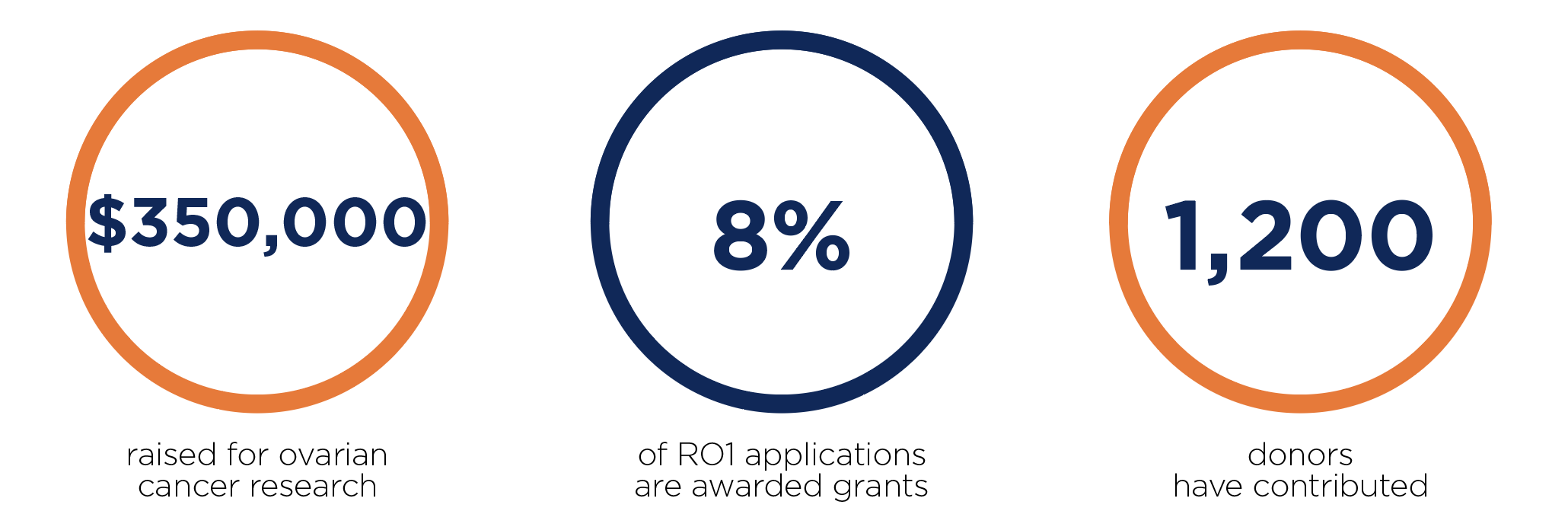One Woman, A Devoted Community, and New Hope in Fighting Ovarian Cancer
When Marty Whitlow was diagnosed with ovarian cancer in 2009, all of her teacher instincts kicked in. She knew that she wanted to educate others about this silent, devastating cancer. Very soon, she pulled together family and friends and began to hold events to promote ovarian cancer awareness and to raise money for research at UVA Cancer Center. As her cancer progressed, Marty’s friends carried on the effort with numerous events, including the Dance for Life, Golf for Life, various concerts, auctions, and other gatherings and activities. Even after Marty’s death in 2014, these events continued to mobilize the central Virginia community around ovarian cancer awareness and raise funds for the Marty Whitlow Ovarian Cancer Research Fund at UVA. Over the past eight years, approximately 1,200 individuals have contributed more than $350,000 to the fund in Marty’s name.
“It’s remarkable how the community has stepped up to support this fund,” says John Whitlow, Marty’s husband, who organized many of the fundraisers. “Marty would be amazed and overwhelmed by this outpouring of support.”
As the Whitlow Fund has grown, it has made an immense impact in ovarian cancer research under the direction of Chip Landen, MD, associate professor of gynecologic oncology. Earlier this year, Landen received a prestigious RO1 grant of $2.2 million from the National Institutes of Health (NIH). He was successful in applying for this grant, thanks to critical early-stage investigations made possible by the Whitlow Fund, which allowed him to conduct preliminary studies and gather vital data necessary to show the exciting potential of his work. In today’s competitive environment, only 8 percent of RO1 applications succeed in receiving NIH funding. Advancing the science needed to compete successfully for this funding poses a tremendous challenge for researchers.

“Private philanthropy is essential in advancing early-stage research,” says Susan Modesitt, MD, who directs UVA’s Division of Gynecologic Oncology. “The Whitlow Fund, together with other private gifts and departmental and Cancer Center support, was vitally important for Chip’s success in moving his novel research forward. Future ovarian cancer patients will be indebted to the Whitlow donors for opening the door to this potentially lifesaving research.”
Specifically, Landen’s team focuses on ovarian cancer recurrence following chemotherapy. Each year, 21,700 women in the US are diagnosed with ovarian cancer. Eighty percent of those with advanced cases who are treated with chemotherapy experience cancer recurrence. Twenty-five percent of those with early-stage disease also have recurrence following chemotherapy. Chemoresistant cells are primarily responsible for this recurrence. Landen and his team study how tumor cells become resistant to chemotherapy and the specific molecular pathways that, when targeted, lead to cancer cells becoming more sensitive to chemotherapy. The team’s goal is to combine increased sensitivity with new potential drugs in the effort to eliminate all cancerous cells.
Currently, scientists have identified a new drug that appears to be effective in killing chemoresistant cells. The RO1 grant will help the Landen team move forward to develop effective models to test the drug, validate its potential, and ensure its safety. Their research, while concentrated on chemoresistant cells in ovarian cancer, could also have immense implications for other cancers. Thanks to efforts supported by the Marty Whitlow Ovarian Cancer Research Fund, their results could help shape the future of cancer care.
“Virtually every cancer that takes the life of a patient is due to chemoresistance,” says Landen. “To achieve lasting cancer cures, we must understand the molecular mechanisms of chemo resistance and develop ways to control them. This is one of the surest ways to offer enduring hope to cancer patients. We are extremely grateful to all of those who have partnered with us in this research by contributing to the Marty Whitlow Fund.”
